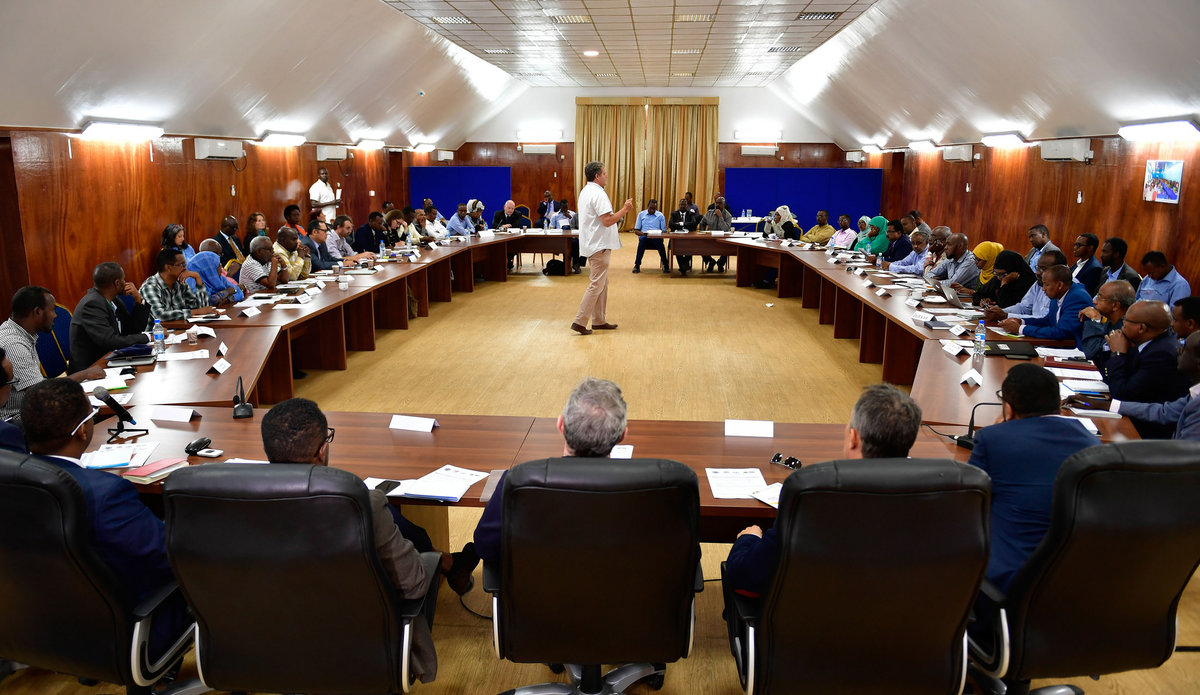Humanitarian agencies urged to work together to strengthen disaster response in Somalia
Mogadishu - The Federal Minister for Humanitarian Affairs and Disaster Management Maryam Qasim urged international humanitarian agencies in Somalia to collaborate more closely with local aid organizations to deliver assistance to the intended recipients during a meeting held in Mogadishu yesterday.
The conference brought together local and international organizations engaged in delivering humanitarian aid to drought victims. Minister Qasim said the federal government was working to institutionalize national disaster management to promote effective disaster preparedness.
The minister called for greater involvement of local non-governmental organizations (NGOs) and the private sector in the funding and assistance to vulnerable groups in order to foster a culture of resilience and safety in communities.
“We need to promote the growing role of local responders and the private sector. We need to see more local investment going through the local responders. Today, more than ever, we need to work with local responders and ensure they are prepared to manage huge funding and that systems are in place to ensure that aid reaches its intended recipients,” Dr. Qasim added.
The Deputy Special Representative of the UN Secretary-General (DSRSG) for Somalia and UN Resident Humanitarian Coordinator for Somalia, Peter de Clercq, lauded Somali NGOs for their crucial role in averting famine thus far this year.
“We can again look at some of the positive aspects that are coming out of the drought in terms of empowering local actors and I want, in this respect, to mention the Somalia Humanitarian Fund that we have used where we continue to prioritize national NGOs,” the DSRSG said, noting that of the $45 million that was allocated under the humanitarian fund, 38 percent was channeled to national NGOs.
The head of the humanitarian, health and resilience team for Somalia at the United Kingdom’s Department for International Development, Seb Fouquet, challenged local actors to put the interests of the most vulnerable people at the heart of their activities.
The head of the United Nations Office for the Coordination of Humanitarian Affairs (UNOCHA) in Somalia, Justin Brady, praised local actors for their role in preventing the current drought afflicting the country from causing a famine.
“In order to prevent famine, it required a shift into more rural areas, and that by definition necessitated reliance on more Somali national actors. I think some of what we did in the area between 2011 and 2012 and the beginning of this crisis paid off,” noted Mr. Brady.
Also participating in the workshop were officials from the private sector including the Director of the Hormuud Foundation, Abdullahi Osman, who said the Somali business community actively participated in the drought response effort because so many of the people affected by the crisis are “our clients.”
Abdihakim Aynte, the founder of an online network known as Cawiwalaal (which means “help a brother and sister” in Somali) that was established to raise funds from Somalis at home and abroad for drought victims, said its role was intended to complement the efforts of humanitarian organizations in addressing the crisis.
The meeting was a follow up to a similar conference held in Nairobi last May that examined the role of local humanitarian organizations in the overall drought response effort.
 UN
UN





